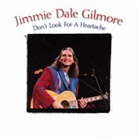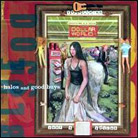May 2004
Gilmore sometimes gets lumped together with younger musicians in the Americana/alt-country movement, but his music doesn’t sound alt-anything to me. The fact that Gilmore’s music doesn’t get played on country radio and TV says more about them that it does about him. I’m betting he won’t tell you his major influence is the Eagles. This is country, without qualifications, and even when Gilmore leans towards rock it’s rockabilly. Gilmore's music is deeply felt, beautifully crafted, and smart. A lot of stories about Gilmore play up his spiritual journeys (he spent three years in a religious community in Denver) and there is a tremendous calm at the center of his work. He sounds confident, both of his abilities and of his commitment to the purity of his approach. I've been listening to Joe Ely's version of Gilmore's "Dallas," which opens Don't Look for a Heartache, for more than 20 years. There's some swagger in Ely's harder-rocking version of the song. Gilmore gives it a more straightforward country reading that conveys more starkly the experience of living in a big city -- the excitement that gives way to disappointment. In Ely's version, the singer wants to fight back. In Gilmore's, there's more resignation and sadness. I'd hate to choose between the two versions, and there's no need to. Each shows how a singer can bring depth and subtle shades of meaning to a song, making it his own while remaining true to it. Gilmore wrote or co-wrote (with Butch Hancock) six of the tunes on Don’t Look for a Heartache. Hancock wrote four others, and Ely contributes "Honky Tonk Masquerade" from Fair And Square, which he produced. These three have worked together so often and covered each other’s songs so many times, it’s no wonder the Flatlanders’ discs flow so easily. All are literate, poetic writers, but I can’t imagine even Butch Hancock could give his own "Just a Wave, Not the Water" a better reading than Gilmore gives it here. His performance suggests a lifetime’s understanding and hard-won insight:
Gilmore brings to every song he sings a determination to make its meaning clear and to express its emotions without artifice. The musicians who accompany him on the two sessions are exceptionally sensitive and tasteful in their playing. The guitar flash on Townes Van Zandt’s "White Freight Liner Blues" is enough to make other guitarists set aside their instruments for a while, but even on that tune the musicians don’t overshadow Gilmore. Some critics suggest that Fair and Square and Jimmie Dale Gilmore are weak entries in Gilmore's discography. Don't Look for a Heartache seems to disprove that. The mastering, by the way, is excellent -- vivid, lively, and detailed. The Blue Dogs are a South Carolina band that has been touring heavily since 1996, selling 100,000 copies of their discs along the way. They describe themselves on their website (www.bluedogs.com) as "…somewhere to the right of Americana and left of mainstream Nashville." In fact, the Blue Dogs are the essence of mainstream Nashville. You could tune your TV to CMT virtually any hour of the day and hear the kind of '70s rock-influenced country that suffuses their new release, Halos and Good Buys. Don Gehman produced the disc, and it’s slick and professional. Gehman did fine work with John Mellencamp (Uh Huh, Scarecrow, Lonesome Jubilee), but here he presents us with a countrified version of Hootie and the Blowfish, whom he also produced. Most of the songs on Halos and Good Buys could have resulted from a focus-group study. These lyrics from "What's Wrong with Love Songs" are typical of the hackneyed approach of the band's primary songwriters, Bobby Houck and Hank Futch:
The music is just as predictable -- and that reference to Merle is as close as you'll get here to real country. The playing and singing are all of a high, professional order, but I never found myself taking note of a particular guitar solo or vocal. The assembly-line quality of Halos and Good Buys is only reinforced by the song titles: "Wrong Love at the Right Time," "Make Your Mama Proud," "Cosmic Cowboy," and so on. The Blue Dogs, at least on this disc, are to country what bands like Nickelback are to rock'n'roll -- a generic equivalent, but not to be confused with the genuine article. The pity is that they are the rule, while someone like Jimmie Dale Gilmore is the exception. GO BACK TO: |
 Jimmie Dale Gilmore - Don't Look for a Heartache
Jimmie Dale Gilmore - Don't Look for a Heartache The Blue Dogs - Halos and Good Buys
The Blue Dogs - Halos and Good Buys Jimmie Dale
Gilmore’s unusual tenor may take a little getting used to, but it’s a
wonderfully honest, expressive instrument -- he sings without affectation or bluster. Like
that of his partners in the Flatlanders, Joe Ely and Butch Hancock, Gilmore's songwriting
shows a deep understanding of country, rock'n'roll and western swing, and a talent for
writing lyrics that are wise, funny and seemingly effortless. His first two discs, Fair
and Square (1988) and Jimmie Dale Gilmore (1989), appear to be out of print,
but HighTone has picked 14 tracks from them and added a previously unreleased title for
this nicely paced compilation.
Jimmie Dale
Gilmore’s unusual tenor may take a little getting used to, but it’s a
wonderfully honest, expressive instrument -- he sings without affectation or bluster. Like
that of his partners in the Flatlanders, Joe Ely and Butch Hancock, Gilmore's songwriting
shows a deep understanding of country, rock'n'roll and western swing, and a talent for
writing lyrics that are wise, funny and seemingly effortless. His first two discs, Fair
and Square (1988) and Jimmie Dale Gilmore (1989), appear to be out of print,
but HighTone has picked 14 tracks from them and added a previously unreleased title for
this nicely paced compilation.